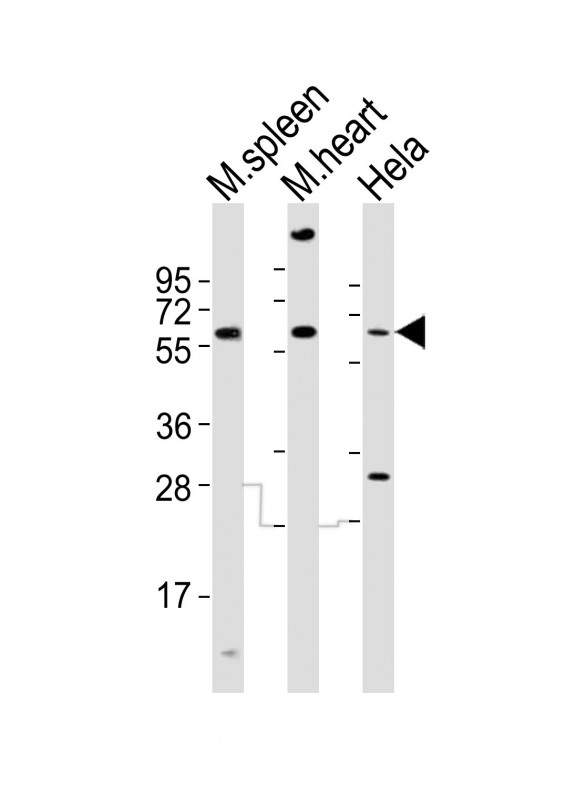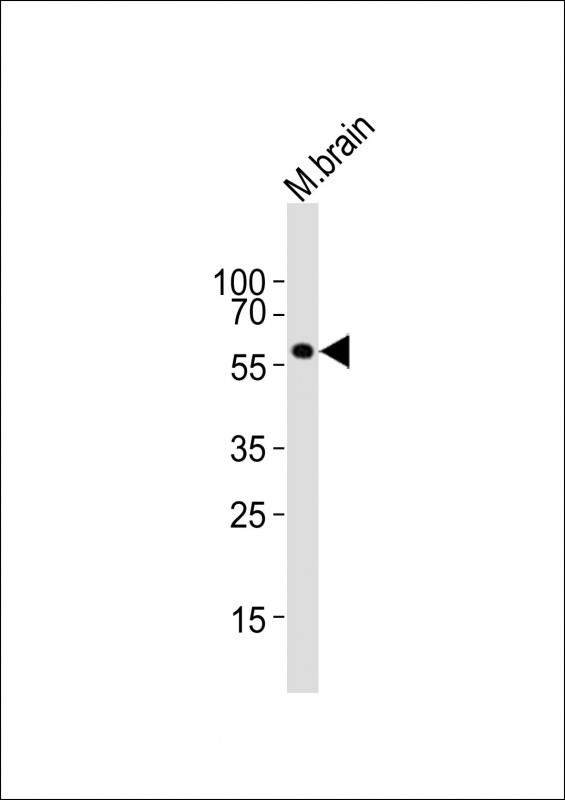

| WB | 1/1000-1/2000 | Human,Mouse,Rat |
| IF | 咨询技术 | Human,Mouse,Rat |
| IHC | 咨询技术 | Human,Mouse,Rat |
| ICC | 技术咨询 | Human,Mouse,Rat |
| FCM | 咨询技术 | Human,Mouse,Rat |
| Elisa | 咨询技术 | Human,Mouse,Rat |
| Aliases | Cell cycle checkpoint control protein RAD9A, mRAD9, DNA repair exonuclease rad9 homolog A, Rad9-like protein, Rad9a, Rad9 |
| Entrez GeneID | 19367 |
| WB Predicted band size | 42.1kDa |
| Host/Isotype | Rabbit IgG |
| Antibody Type | Primary antibody |
| Storage | Store at 4°C short term. Aliquot and store at -20°C long term. Avoid freeze/thaw cycles. |
| Species Reactivity | Human, Mouse |
| Immunogen | This Mouse Rad9a antibody is generated from a rabbit immunized with a KLH conjugated synthetic peptide between 279-313 amino acids from the C-terminal region of Mouse Rad9a. |
+ +
以下是关于小鼠Rad9a抗体的3篇参考文献及其简要摘要:
---
1. **"Rad9a Is Essential for Embryonic Development and Genome Stability in Mice"**
*作者:Wang et al. (2016)*
**摘要**:本研究通过构建Rad9a基因敲除小鼠,利用针对小鼠Rad9a的特异性抗体进行Western blot和免疫组化分析,发现Rad9a缺失导致胚胎致死和基因组不稳定,揭示其在DNA损伤应答中的关键作用。
2. **"Characterization of Rad9a Antibody for Detecting DNA Damage Response in Mouse Cells"**
*作者:Li et al. (2012)*
**摘要**:文章描述了一种兔源多克隆抗体的开发与验证,该抗体特异性识别小鼠Rad9a蛋白,适用于免疫沉淀(IP)和免疫荧光(IF)实验,证实Rad9a在电离辐射后定位于DNA损伤位点。
3. **"Rad9a Regulates Hematopoietic Stem Cell Homeostasis via p53 Pathway"**
*作者:Zhang et al. (2018)*
**摘要**:通过流式细胞术和Western blot(使用小鼠Rad9a抗体),研究发现Rad9a缺失会激活p53通路,导致造血干细胞衰竭,表明其在维持干细胞稳态中的功能依赖DNA修复机制。
---
这些文献均使用小鼠Rad9a抗体进行蛋白检测或功能研究,涉及胚胎发育、DNA损伤应答及干细胞调控等领域。
**Background of Mouse Rad9a Antibody**
The Rad9a protein, encoded by the *Rad9a* gene (also known as *Rad9*), plays a critical role in DNA damage response and repair pathways, particularly in maintaining genomic stability. As a component of the 9-1-1 (Rad9-Rad1-Hus1) checkpoint clamp complex, Rad9a contributes to the activation of cell cycle checkpoints, allowing cells to pause progression and repair DNA lesions before replication or division. This function is vital for preventing mutagenesis and chromosomal aberrations, which are hallmarks of cancer and other genetic disorders.
Mouse Rad9a antibodies are immunological tools specifically designed to detect and study the Rad9a protein in murine models. These antibodies are typically generated by immunizing host species (e.g., rabbits or mice) with purified Rad9a protein fragments or synthetic peptides corresponding to conserved regions of the mouse Rad9a sequence. They are widely used in techniques such as Western blotting, immunohistochemistry (IHC), immunofluorescence (IF), and co-immunoprecipitation (Co-IP) to analyze Rad9a expression, localization, and interactions in tissues or cell lines.
Research utilizing Mouse Rad9a antibodies has shed light on its role in tumor suppression, DNA repair mechanisms (e.g., homologous recombination repair), and responses to genotoxic stress, including radiation or chemotherapy. Additionally, studies in *Rad9a*-knockout mice highlight its essentiality in embryonic development and cellular viability. Validated Mouse Rad9a antibodies are crucial for exploring molecular pathways underlying cancer, aging, and therapeutic resistance, making them valuable in both basic and translational research contexts.
×